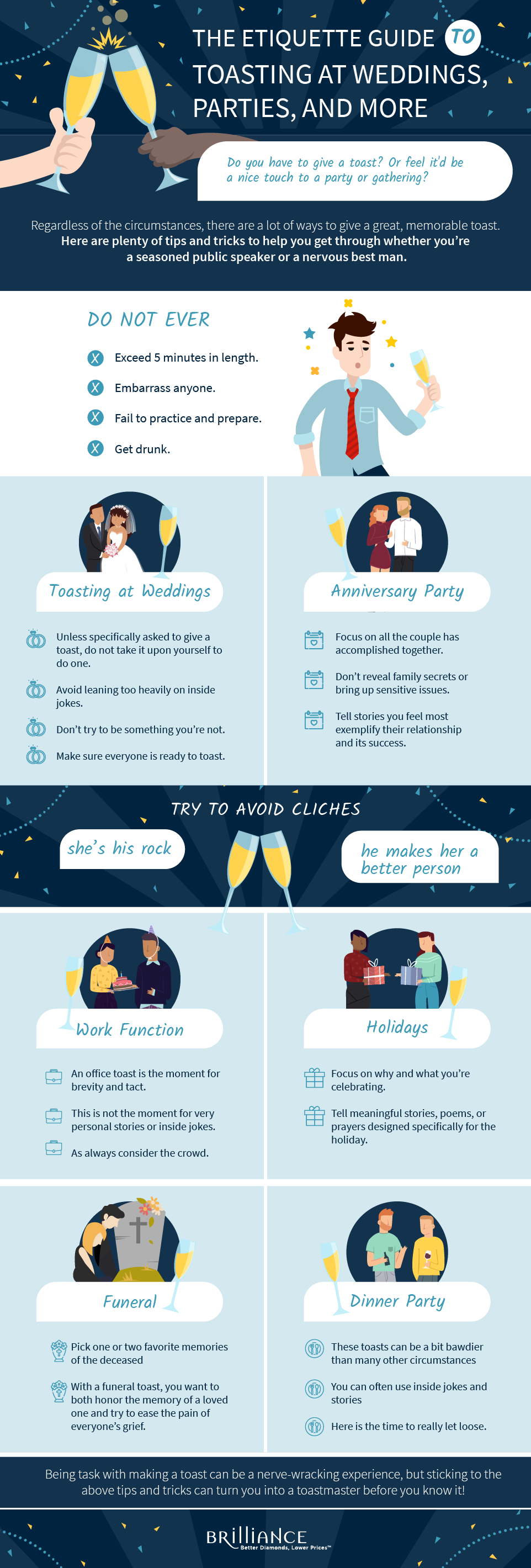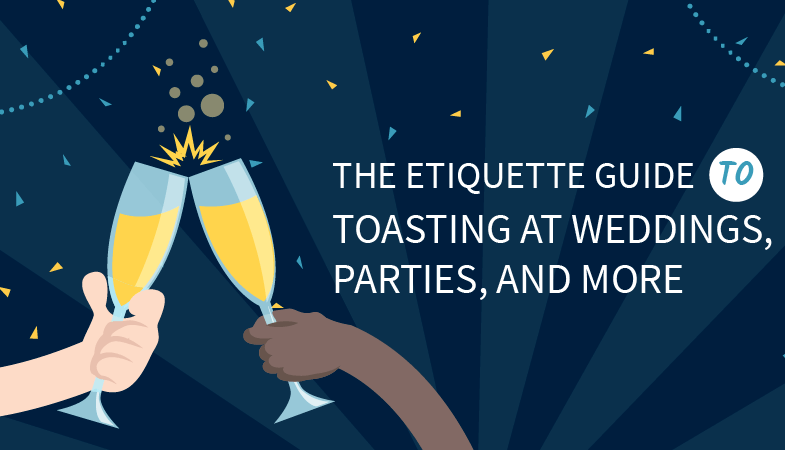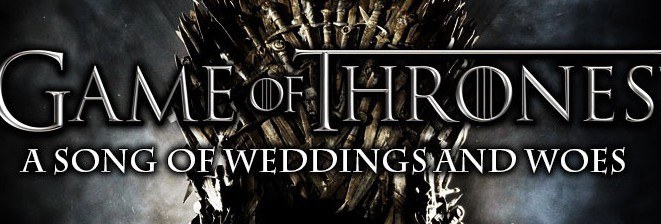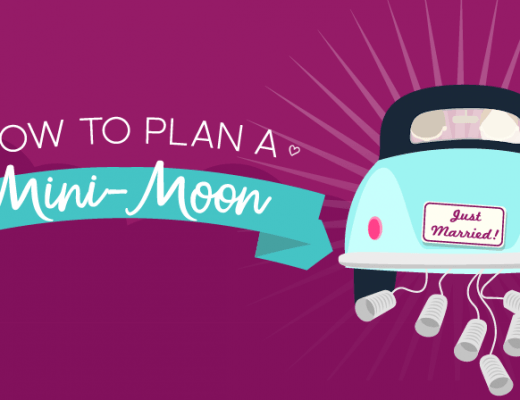Toasting—it’s a time-honored tradition that dates back to ancient Greece. What began as a way to pay tribute to the gods has evolved over the years to hold significance for a variety of reasons. Nowadays, we toast at an assortment of gatherings, ranging from weddings to anniversary parties to holiday meals to office parties to funerals.
For many, toasting is considered an art. Indeed, even in ancient times, many regarded toasting as a competition, a way of throwing down the gauntlet, a way of challenging your drinking buddies to match you cup for cup. Eventually, it became more refined with toasts becoming an opportunity to showcase one’s gifts of rhetoric and intelligence.
Nowadays, it can fill many purposes, whether it be to honor friends or loved ones or to prove one’s good humor, wit, and more. Toastmaster Clubs still exist as a way to celebrate the art of toasting and promote it as a competitive activity—yet, nowadays toasting is mostly reserved for special events.
Do you have to give a toast? Or are you just planning a party or gathering and feel like it’d be a nice touch to the proceedings?
Regardless of the circumstances, there are a lot of ways to give a great, memorable toast. There’s also many ways to make a huge faux pas that will ensure your toast is remembered for all the wrong reasons. Here are plenty of tips and tricks to help you get through whether you’re a seasoned public speaker or a nervous best man.
Do Not Ever
No matter where you’re giving a toast, here are some general tips to avoid giving a rude or cringe-worthy toast:
- Exceed 5 minutes in length.
- Embarrass anyone (if your story is likely to hurt someone’s feelings or mortify the guests you’re honoring, just leave it out). Unless you’re taking good-natured shots at yourself, this is likely to end badly for you and others involved. Always read the room, but it’s best to avoid humiliation at any cost.
- Fail to practice and prepare—yes, improvisation is a key tool for giving a great toast, feeding off of and responding to an audience’s energy (and occasional commentary), but never wing the whole thing. Even if you don’t write down your speech word for word, you should still have a general idea of what you’re going to say, the arc it will follow. Then, practice giving your speech at least once at home so you can work out any kinks and get a feel of what you’re going to do.
- Get drunk—if you’re not a practiced public speaker, you may get nervous and want a glass of something to help calm your nerves. That’s perfectly acceptable, but don’t overdo it. There’s nothing worse than a drunk, unintelligible speech.
Toasting at Weddings
The most common place you’ll find yourself having to give a toast is at a wedding. Unless you’re specifically asked by the bride and groom to give a toast for your best friend, do not take it upon yourself to do one. It’s tradition for the best man, maid of honor, and parents of the bride and groom to make toasts, but you should still check to be sure they wish to do this.
Weddings are the key place to keep your audience in mind—you want to tell a funny, touching, heartwarming story about the bride and groom, but you need to be sure it will be something that will work for everyone. This is a particular place to avoid really raunchy or embarrassing stories —when parents and grandparents are in the audience, you don’t want to run the risk of deeply offending them (or forcing them to listen to something they can never unhear).
You should also avoid leaning too heavily on inside jokes—save them for the dance floor. You want the toast to be something the entire audience can enjoy, so don’t choose stories or punchlines that exclude large portions of it. Instead, choose one story that you feel reflects why you admire the bride and groom or why they are a good match and stick with that.
Because wedding toasts are so common, there are a lot of scripts and cliches (she’s his rock; he makes her a better person) out there. Try to avoid these at all costs. Instead, write down and memorize something (small note cards are ok) that is in your own voice (you want to sound like yourself up there) and utterly sincere. If you’re naturally funny, then sprinkle in a bunch of humor. If, instead, you’re a more touchy-feely person, go that route.
The surest way to fall flat on your face is to try to be something you’re not. If you want to make a truly memorable toast, don’t forget to think outside the box when you’re playing to your strengths. Sing a few bars acapella; lead the wedding party in a choreographed dance — so long as you know it’s something the wedding party would appreciate and it isn’t a bid to make it all about yourself, have fun.
Lastly, and most importantly, most likely at a wedding, you’re toasting before a larger crowd. Make sure everyone is ready to toast—the staff should handle making sure everyone has a full glass for the moment, but be sure to end your toast with a clear call to raise and clink glasses in honor of the newlyweds. And to be polite, always sip from your glass to set the example for the guests.
Anniversary Party
Odds are if you’re giving an anniversary toast, you’re a family member or extremely close friend of the couple in question. An anniversary party tends to be a celebration of that couple’s life together, which means your toast should be directed toward that.
As you’re planning your toast, consider what this milestone means for the couple and their relationship—your toast should be sincere and focus on all the couple has accomplished together. Don’t be afraid to honor the challenges they’ve conquered together, but remember this is a time for celebration—don’t use your toast as a time to reveal family secrets, bring up sensitive issues, or anything of that nature.
Instead tell some of your favorite stories about the couple, ones you feel most exemplify their relationship and its success. There are lots of quotes out there in the world tied to certain milestones (i.e. 25 or 50 years), so if you feel it’s fitting you could choose to work one into your speech.
Work Function
An office toast is the moment for brevity and tact. This is not the moment for very personal stories or inside jokes—the last thing you want to do is embarrass yourself or a coworker in front of your boss. It could have some very serious consequences.
As always consider the crowd—if it’s a small group you’ve worked with for years, you likely have more leeway than a full office gathering. As a rule of thumb, don’t say anything you wouldn’t say in an office meeting. Stick to the point— why you’re there, honoring someone if the occasion calls for it, and calling for everyone to raise a glass.
Holidays
Whether you’re gathering round the table for Thanksgiving, enjoying a Christmas shindig, or having a ball at a costume party, the holidays are always a wonderful time for large group gatherings.
If you’re hosting, you may wish to give a toast (or your family may ask you to lead the table in prayer/toast). In this instance, make sure you focus on why and what you’re celebrating—send up gratitude that you can all be together on this particular holiday and if it makes sense, pay tribute to the holiday itself.
You can do this with meaningful stories, poems, or prayers designed specifically for the holiday. This is an instance where it’s far more acceptable to rely on quotes and other’s writing to get your message home. No matter what you’re celebrating, make it meaningful and merry.
Funeral
A funeral is probably the most somber place you’ll ever have to make a toast and the odds are you’ll be toasting to the memory of someone no longer with us. Tone here is crucial—in some cases, it can essentially be another eulogy.
Pick one or two favorite memories of the deceased to share that you feel sums up who they were. If they’re funny all the better—with a funeral toast, you want to both honor the memory of a loved one and try to ease the pain of everyone’s grief.
If you find yourself overwhelmed by the loss but still feel obligated to make a toast, choose a short and sweet prayer and poem and allow it to do the hard work for you.
Dinner Party
A dinner party tends to be an intimate gathering of hand-selected guests—hopefully, everyone there knows each other well and has some shared history. These toasts can be a bit bawdier than many other circumstances, and you can often use inside jokes and stories to hammer home a point because you know everyone there will get it.
Here is the time to really let loose—whatever you’re toasting, have fun knowing you’re among trusted friends. Of course, a toast might seem a bit excessive at a run-of-the-mill dinner party so you could also just opt for something short and sweet to show your appreciation to all who attended.
Whether you’re an experienced public speaker or not, being tasked with making a toast can be a nerve-wracking experience. But if you always keep your audience and the event in mind and stick to the above tips and tricks, you should be a toastmaster before you know it.






